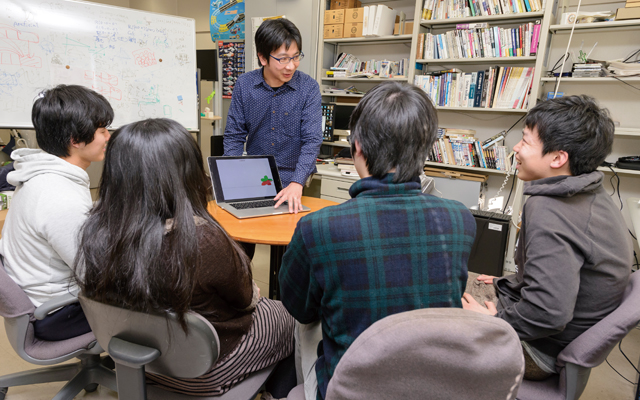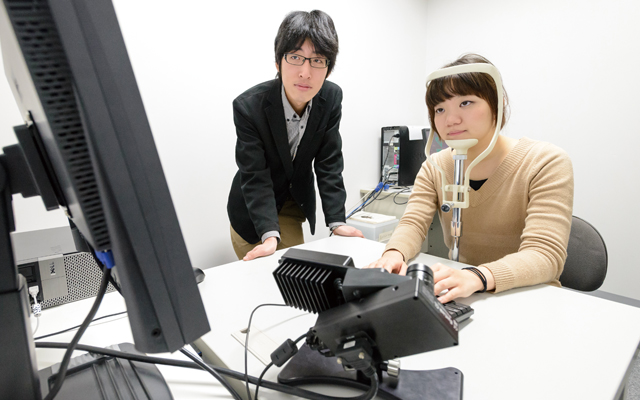
Concept / About the department
Message from the president
Starting with the 2017 academic year, Nagoya University established a new School of Informatics.
Our lives have changed tremendously with the rapid development of information technologies. The widespread use of social media has significantly altered the way people communicate with one another, while search engines have revolutionized the way we acquire new information. Advances in information technology have also opened up new fields of scientific inquiry like bioinformatics, which analyzes the data stored in our genes in order to discover more about life itself.
These trends are only gaining momentum, and there are so many innovations just beyond the horizon. It won't be long before automated driving systems allow machines to take the wheel rather than humans, for example, or we are able to make strides towards better health through preventive medicine strategies that analyze past health and treatment information. Scientists tell us that artificial intelligence systems will soon be able to surpass humans in terms of cognitive ability.
At the same time, the social changes that come with the rapid digitization of our world have a major impact on people, and bring with them new challenges in terms of information ethics, the protection of personal data, and more. If we are to ensure the healthy development of our information society, we must rethink our approach to people and communities through an information lens.
It is with this in mind that Nagoya University has decided to open a School of Informatics starting with the 2017 academic year. The new school will be a place for comprehensive education and research on information-related topics from a variety of perspectives—scientific, technological, human, social, and more. Our goal is to turn out cutting-edge information professionals ready to deliver what our changing society needs.
We are seeking new students eager to take on the challenge of using information to revolutionize our society and solve the many problems plaguing the human race. Welcome to the School of Informatics.

Key features
1
Cross-departmental building block courses
Students will receive an education in the following three areas, designed to give them a universal understanding of large natural and social systems based on data and figures, which in turn will help them create new value while resolving some of the issues plaguing humanity. The purpose of these courses is to develop integrated professionals with broad knowledge and perspectives as well as a comprehensive grasp of informatics that transcends the boundaries of the humanities or sciences alone.
(a) Fundamentals of informatics and technology
(b) Basic information explaining natural and social systems
(c) Building blocks for developing universal perspectives
2
Majors that are both
specialized and integrated
The new School of Informatics will be divided into three departments: the Natural Science Informatics Department, Human and Social Informatics Department, and the Computer Science Department. Each department offers students an opportunity to delve deeper into the cutting-edge specialist knowledge unique to that field.
At the same time, the curriculum will value social connection—offering courses in ethics, law, management and other areas to give students an integrated education that forces them to think about how their chosen field ties into different disciplines. They will also take courses in academic English, academic writing, and other subjects to help them develop into sophisticated researchers.
3
Flexible curriculum and
new quarter system
Students will spend their first two years taking courses that give them a basic knowledge of informatics. This structure is built on the idea of late specialization to encourage the development of broader perspectives while students are still deciding on an area of expertise.
The School of Informatics also offers a flexible curriculum structure that gives students until the start of their third year (while they are still building their academic foundations) to transfer to a different department that interests them. We have also adopted a quarter system that divides each semester into two equal parts. The second quarter is left open in students' third and fourth years in the program to make it easier for them to study overseas or participate in an internship program.
Departments
Department of Natural Informatics
Department of Natural Informatics gives students an understanding of informatics through data analysis and numerical modeling of natural and social phenomena, simulations using supercomputers, and other techniques. It seeks to develop professionals who can make groundbreaking new discoveries and help solve the issues humanity faces while addressing the many serious threats to our lives and natural environment. The Natural Science Informatics Department offers two educational tracks to address different areas of student focus.
- 1.Division of Mathematical Informatics dealing with mathematical algorithms that analyze real-world data from the natural environment, society, and human-made objects
- 2.Division of Complex System Science that deals with supercomputer simulations and designs

Department of Human and Social Informatics
Department of Human and Social Informatics seeks to develop professionals who can create new value and revolutionize total communication—for individuals, in personal relationships, and in the way society works. It does this by giving students the ability to expertly use informatics to explain different frameworks, from human psychology, consciousness, and sensation to community and market systems. The Human and Social Informatics Department offers two educational tracks to address different areas of student focus.
- 1. Division of Social Informatics dealing with community informatics, including information ethics and laws, management skills, and communication skills
- 2.Division of Cognitive and Psychological Sciences that deals with informatics knowledge and understanding related to human characteristics and behavior

Department of Computer Science
Department of Computer Science seeks to develop professionals who have the ability to understand society and the natural world and can use informatics and technology to create new value as well as develop new devices, systems, and services. It gives students expert knowledge in informatics and technologies like computers, networks, artificial intelligent, and audio-video processing. The Computer Science Department offers two educational tracks to address different areas of student focus.
- 1.Division of Computing and Software Systems dealing with software and other tools used by computer hardware systems
- 2.Division of Intelligent Systems that deals with informatics and technology as it relates to the natural environment, people, society, and other aspects of the real world

